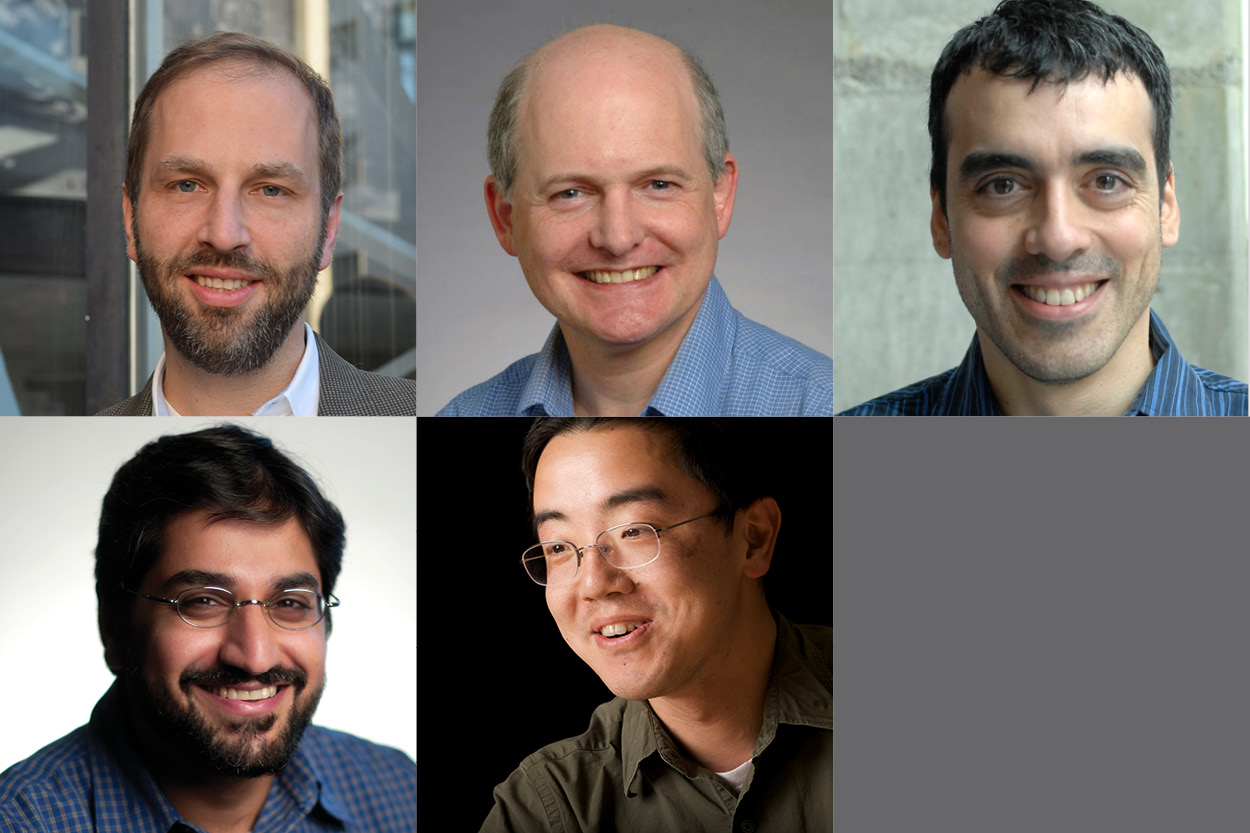Department of Electrical Engineering and Computer Science
Karl Berggren, Charles Leiserson, Pablo Parrilo, Rajeev Ram and Lizhong Zheng receive highest grade of membership in IEEE.
Image may be NSFW.
Clik here to view.
Top row (left to right): Karl Berggren, Charles Leiserson, Pablo Parrilo; bottom row (left to right): Rajeev Ram, Lizhong Zheng
Five EECS faculty have been named IEEE Fellows, the highest grade of membership in the IEEE. The grade of Fellow is conferred by the IEEE Board of Directors to those with an outstanding record of accomplishments in any of the IEEE fields of interest. The new fellows are among only a tenth of a percent of IEEE members awarded the rank in a given year.
Karl Berggren, a professor in EECS, is cited by the IEEE "for contributions to nanofabrication and nanomanufacturing in the sub-10 nm regime." He has developed a set of tools and techniques for nanofabrication of structures in the sub-10-nanometer length-scale range. He has particularly focused on using and understanding lithographic patterning with electron and ion beams. He has integrated these structures with self-assembling materials such as block copolymers, and his methods have found practical application in device development and manufacturing. His application of these methods in superconducting and plasmonic devices and materials has resulted in high-performance single-photon detectors in the infrared spectral region. Karl was also recently elected Fellow of the American Association for the Advancement of Science, and is a member of the team that won the 2015 Optical Society of America Paul T. Forman award.
Charles Leiserson, the Edwin Sibley Webster Professor of Computer Science and Engineering, was elected IEEE Fellow "for leadership in parallel and distributed computing." He led the development of the Cilk multithreaded programming environment, which is now supported by many popular compilers, including GCC, LLVM, and ICC. He is also a coauthor of the most widely used text on computer algorithms, Introduction to Algorithms. Charles holds the Edwin Sibley Webster Chair in EECS, and he is a MacVicar Faculty Fellow, the highest recognition at MIT for undergraduate education. He has received many awards during his 35-year tenure at MIT, including the ACM-IEEE Computer Society 2014 Ken Kennedy High-Performance Computing Award, the IEEE Computer Society 2014 Taylor L. Booth Education Award, and the ACM 2013 Paris Kanellakis Theory and Practice Award. Professor Leiserson is also a Fellow of AAAS, ACM, and SIAM.
Pablo Parrilo, a professor of electrical engineering and computer science, was elected to IEEE Fellow "for contributions to semidefinite and sum-of-squares optimization". He is one of the leading researchers in mathematical optimization and systems and control theory. His work has built new bridges between convex optimization and computational algebraic geometry, which have significantly expanded the impact and applications of optimization to new areas of engineering, statistics and machine learning. Pablo has made seminal contributions in polynomial optimization and matrix rank minimization, as well as in areas as diverse as game theory and quantum information theory. He has received numerous distinctions, including the Donald P. Eckman Award, the SIAG/CST Prize, and the Farkas Prize.
Rajeev Ram, a professor of electrical engineering, is cited by the IEEE "for contributions to semiconductor lasers and integration of photonics with CMOS electronics." He has worked on the fundamental physics of semiconductor light sources — including semiconductor lasers without population inversion, semiconductor Bose-Einstein condensation, and on the demonstration of light sources with greater than 100% wall-plug efficiency. His students established the discipline of CMOS Photonics. This work recently led to the demonstration of a single-chip microprocessor with embedded photonics for memory access. Rajeev is a Fellow of the Optical Society of America and is a MacVicar Faculty Fellow and a Bose Research Fellow at MIT.
Lizhong Zheng, a professor of electrical engineering, is cited by the IEEE “for contributions to the theory of multiple antenna communication”. He has made significant contributions in the general area of information theory, communications, coding and wireless networks. In particular, his works on wideband communications, secrecy, unequal error protection, feedback, and relay networks are considered conceptual extensions to Shannon theory. He has also made contributions in extending the scope of information theory to a broader range of problems in statistical inference. Lizhong has played a leading role in developing and applying the tools of information geometry, which helps to carry information theoretic methodology to data analytics. He has received an IEEE Information Theory Society best paper award.
For more information see the IEEE site.
News Image:
Clik here to view.
